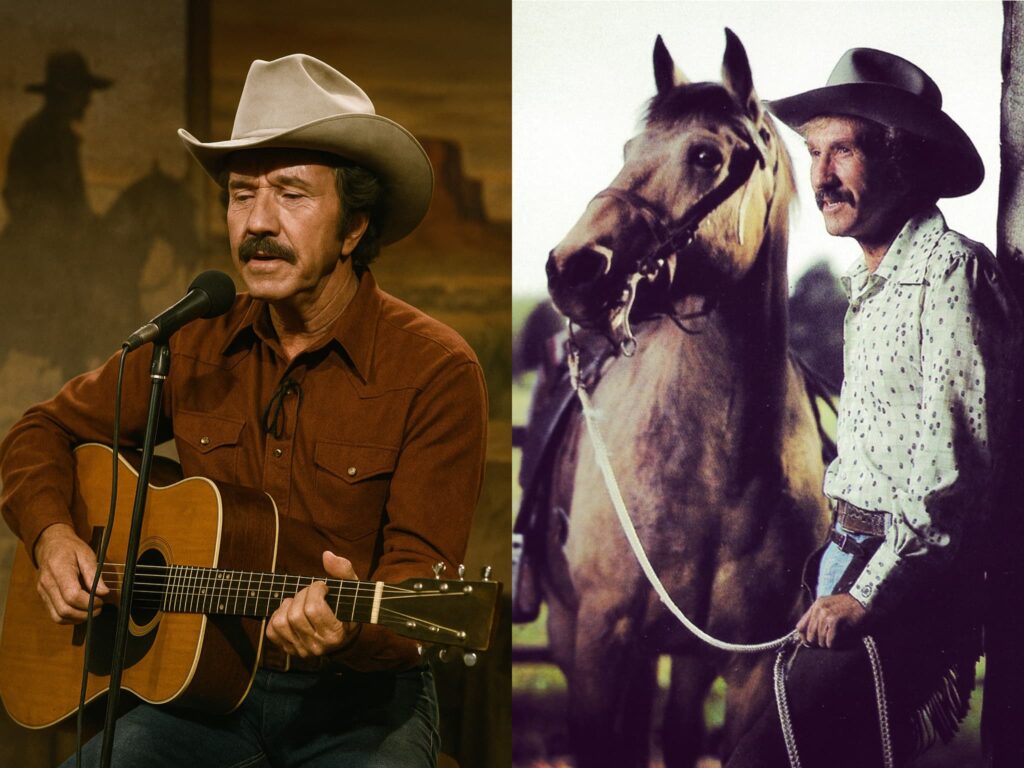
Marty Robbins’ “Utah Carol” – A Timeless Tale of Love, Loss, and the Untamed West
Ah, my dear reader, pull up a comfortable chair, perhaps by a crackling fire, and let the embers of memory glow as we revisit a timeless classic. We’re about to delve into the heart of the American West, painted vividly by the incomparable Marty Robbins, and his stirring ballad, “Utah Carol.” This isn’t just a song; it’s a testament to courage, sacrifice, and the raw, unvarnished spirit of the frontier, a narrative that speaks directly to the soul of those who remember a time when heroes rode horses and honor was a tangible thing.
Released in 1959, “Utah Carol” found its home on one of the most iconic albums in country and western music history: Marty Robbins‘ masterful Gunfighter Ballads and Trail Songs. While not released as a single itself, the album was a monumental success, climbing to an impressive number 6 on the U.S. pop albums chart. This was no small feat for a country album in an era where pop music often dominated the airwaves. Its success speaks volumes about the enduring appeal of these narrative-driven songs, proving that stories of cowboys and the untamed wilderness held a special place in the hearts of listeners across all genres. Indeed, the Library of Congress has even cited Gunfighter Ballads and Trail Songs as “culturally, historically, or artistically significant,” a testament to its lasting impact.
The story behind “Utah Carol” is, in many ways, the very essence of Marty Robbins‘ artistry. He possessed a unique ability to weave cinematic tales through song, often drawing from the rich tapestry of Western lore. While not a direct autobiographical piece like some of his more personal songs, “Utah Carol” embodies the spirit of the Western tales that captivated him from a young age. Marty Robbins himself grew up on the desert near Phoenix, Arizona, in the 1930s, idolizing singing cowboys like Gene Autry. His maternal grandfather, “Texas Bob” Heckle, a traveling salesman and raconteur, regaled young Martin David Robinson (who would later become Marty Robbins) with stories of the Old West, which deeply influenced his songwriting. These weren’t just simple anecdotes; they were foundational myths that shaped his understanding of courage, loyalty, and the harsh realities of life on the range.
The meaning of “Utah Carol” is a poignant exploration of selfless heroism and the deep bonds forged in the face of danger. The song tells the tragic tale of a cowboy named Utah (or Utah Carl, as some versions imply), a devoted partner and friend, who makes the ultimate sacrifice to save a young girl, Lenora, from a stampeding herd of cattle. The narrative unfolds with a gripping intensity, painting a vivid picture of the chaotic scene: the thundering hooves, the slipping blanket, the child’s perilous fall, and Utah’s desperate, valiant charge. “Lie still, Lenora, I’m a-coming, dear,” are the heart-wrenching words he cries, a testament to his unwavering determination. Despite his valiant efforts to turn the cattle, using a red blanket as a distraction, he is ultimately overwhelmed and trampled, dying a hero’s death. The narrator, who loved Utah “like a brother,” laments his inability to reach him in time, a common and deeply relatable feeling of helplessness in the face of inevitable tragedy. The song concludes with a reflection on Utah’s fate in the afterlife, suggesting that God would be merciful to a man who died saving a child, highlighting the moral compass that guided these rugged individuals.
It’s a ballad that transports you back to a time when life was raw and unforgiving, where everyday existence was a struggle against the elements and sudden peril. The spare arrangement, with Marty Robbins‘ resonant vocals and the signature Western guitar flourishes, enhances the feeling of authenticity, almost as if you’re sitting around a campfire, listening to a grizzled cowboy recount a legend. This wasn’t manufactured heroism; it was the simple, profound courage born of circumstance and an innate sense of duty.
For those of us who remember these kinds of stories, sung with such sincerity and passion, “Utah Carol” isn’t just a song; it’s a window into a bygone era. It reminds us of the power of a well-told tale, the kind that stirs the emotions and leaves an indelible mark on the heart. Marty Robbins was a master storyteller, and in “Utah Carol,” he gave us a piece of the American soul, forever etched in the annals of country and western music. It’s a mournful, yet ultimately uplifting, tribute to the kind of quiet heroism that defined the spirit of the Old West, a spirit that, thanks to songs like this, continues to ride on.